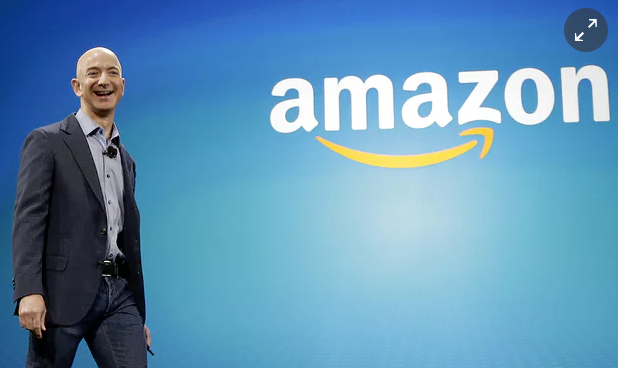Share price jump of 40% in 2017 made founder worth $91bn – for a short while leapfrogging the fortune of Microsoft founder Bill Gates The founder of Amazon, Jeff Bezos briefly overtook Microsoft’s Bill Gates to become the world’s richest person.
Bezos leapfrogged Gates, who has been the richest man on the planet since 2013, after a rise in the share price of Amazon ahead of its latest results due Thursday night.
According to a real-time billionaires index compiled by Forbes, the rise pushed the value of Bezos’s fortune to $91bn (£69bn) – compared with Gates’ wealth of $90bn. Their riches are calculated on the share prices of their respective companies and at the current values Bezos’s stake is twice as big as carmaker Ford.
But the Amazon share price fell back leaving Gates on top, but with less than $1bn separating them.
Bezos – born in Albuquerque, New Mexico, in 1964 – keeps a relatively low profile, but has used some of the wealth he has amassed to buy the Washington Post and invest in space travel through Blue Origin, a company he founded in 2000.
He began Amazon in 1994 when he sold books from his garage in Seattle before expanding into a huge range of other products and capturing the global rush to online shopping.
Amazon now accounts for 43% of everything sold online in the US and 64 million people have signed up for its Prime service – which gives access to free deliveries and video streaming. Amazon shares have soared this year – making the company worth more than $500bn.
Jeff Bezos: the 'obsessive' Amazon founder and world's next richest man
Read more
At the start of 2017, Bezos was ranked fourth-richest in the world, behind Gates, the investor Warren Buffett and Amancio Ortega, who founded Inditex, the company behind retailer Zara.
The share price rally comes despite accusations by Donald Trump, during the US election campaign, that Amazon was “getting away with murder, tax-wise”. He said Bezos was using the Washington Post for “political influence”.
In January, Bezos pledged the full legal resources of his company to fight the travel ban instituted by the new US president against seven Muslim-majority nations.
Amazon floated on the stock market in 1997. Every year Bezos reprints the letter he sent to shareholders that year, insisting it is only Day 1 for the company and pledging to focus on the long-term and be the market leader.
Advertisement
He has not joined the club of billionaires who pledge to hand over the majority of fortunes to charity – started by Gates and his wife, along with Buffett – but recently tweeted to ask for philanthropic ideas to help in the short term, which he said was in contrast to his long-term approach to running the business.
“I want much of my philanthropic activity to be helping people in the here and now – short term – at the intersection of urgent need and lasting impact.”
Forbes started tracking billionaires in 1987 and Bezos is the seventh person to hold the title of the world’s richest person. In a report on his rise to the top of the rankings, Forbes said Bezos would not be at the top if Gates had not given so much of his wealth away and has calculated that Gates has been the richest person in the world for more than half the 30 years it had been watching the wealth of billionaires.
Sign up to the Media Briefing: news for the news-makers
Read more
The closing share price of Amazon and Microsoft on Thursday will determine whether Bezos cements his position at the top of the league. Microsoft’s shares were down on Thursday.
Technology stocks have been outpacing the rest of the US stock market, but wobbled last month amid concerns that the sector might run of steam. Amazon and others then started to rally again. It remains to be seen whether Bezos is able to permanently claim the top slot.
Amazon has now expanded beyond retailing. It now sells cloud computing services to thousands of businesses ranging from Netflix to the UK’s ministry of justice. It also makes TV shows and the Echo smart speaker, which allows users to speak to Alexa, an electronic personal assistant.
Since you’re here …
… we have a small favour to ask. More people are reading the Guardian than ever but advertising revenues across the media are falling fast. And unlike many news organisations, we haven’t put up a paywall – we want to keep our journalism as open as we can. So you can see why we need to ask for your help. The Guardian’s independent, investigative journalism takes a lot of time, money and hard work to produce. But we do it because we believe our perspective matters – because it might well be your perspective, too.
I appreciate there not being a paywall: it is more democratic for the media to be available for all and not a commodity to be purchased by a few. I’m happy to make a contribution so others with less means still have access to information.
Thomasine F-R.
If everyone who reads our reporting, who likes it, helps to support it, our future would be much more secure.


Very interesting